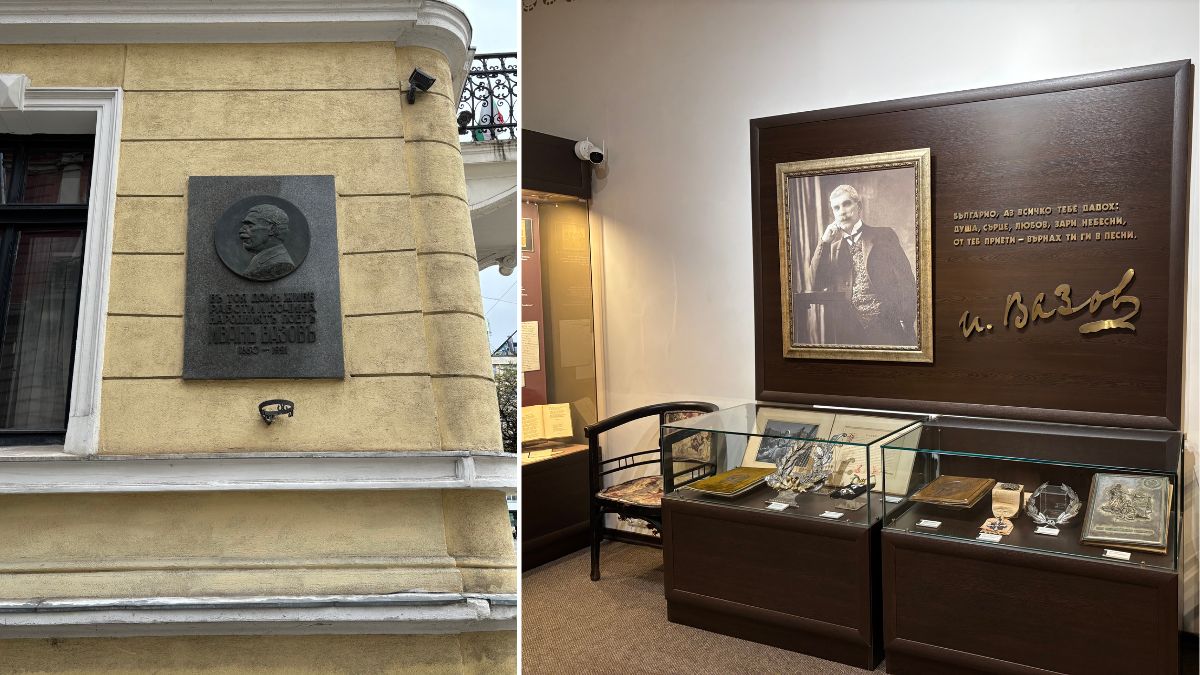Ivan Vazov: Patriarch of Bulgarian Literature

Upon arriving at the Ivan Vazov House Museum in Sofia, Bulgaria, I wondered whether the building feels somewhat squeezed among its neighbours compared to a century ago. Located at 10 Ivan Vazov Street, the house's exterior appeared like any other neoclassical residential structure. The lady attendant pointed out that, once having had a distinct presence as a two-story house amidst single-story buildings, the museum is now overshadowed by high-rise structures.
I gathered from a guided tour of the house that this was the home of Ivan Vazov, the “Patriarch of Bulgarian Literature, " who lived here from 1895 until he died in 1921. His mother, Suba Vazova, was instrumental in getting him this house. After Ivan Vazov’s passing, his home was converted into a museum, becoming the first memorial museum of its kind in Sofia. However, World War II took its toll on the building, and an air raid in March 1944 left it charred. Fortunately, before the strike, the Sofia Municipal Board had evacuated nearly all of Vazov's possessions, and as the museum was rebuilt in September 1944 to its former state, all his collections found their respective places. Today, it is a mute witness to not only the life and work of Vazov but also the tumultuous revolutionary history of the Bulgarian people.
The exhibits in the museum include Vazov’s personal belongings, such as clothes, hats, walking sticks, paintings, a writing table, a bed, chairs, lamps, and collected artefacts, offering visitors insight into his life and era. What is particularly interesting is his compact bedroom on the upper floor and the items on the bedside – a place for books, writing materials, and a medieval European lamp- as well as the room with a reclining chair where he enjoyed having children read his works for hours.
Ivan Vazov, born in 1850 to a wealthy merchant family in Sopot, a village before Bulgaria achieved liberation from Ottoman rule in 1878, played a pivotal role in shaping Bulgarian identity. He wrote novels, plays, prose short stories and poems. Influenced by Hristo Botev, the ideological leader of the Bulgarian revolutionary movement in the 19th century, and influenced mainly by the French literature of Pierre-Jean de Béranger, Victor Hugo and Alphonse de Lamartine, Vazov started writing poems with Botev and some other Bulgarian emigrants in Romania. This was also the period of writers like Fyodor Dostoevski, Ivan Turgenev, Oscar Wilde, and Charles Darwin.
While his most famous work, Under the Yoke, is the first and most significant Bulgarian novel about the April Uprising of 1876 against the Ottoman rule, his poetry collections, such as Epic of the Forgotten (1881–1884) and his short stories depicted the lives of ordinary Bulgarians and their oral traditions. His plays, like Hashove (1894), have contributed immensely to the development of modern Bulgarian drama. His essays and journalistic prose helped shape Bulgarian national consciousness. His writings also played a significant role in shaping the structure of literary language for later writers to follow.
Under The Yoke is against the background of the revolutionary struggle of the Bulgarian people under Ottoman rule. Written between 1888 and 1890, it is regarded as the first significant novel in the Bulgarian language. Interestingly, the English translation was published first in 1994 by the London Publishing House, just a few months before the Bulgarian edition. The novel's protagonist, Boycho Ognyanov, escapes from a prison in Anatolia and returns to the Balkan town of Byala Cherkva to join the rebellion, where he meets enemies, old friends, and his love. Vazov demonstrates mastery in dealing with his characters' dilemmas, emotions, betrayal, and motives alongside a rebellion. He intertwines romantic nationalism with realism. The story concludes with the failure of the revolution, in which the protagonist Ognyanov, his beloved Rada, and other revolutionaries meet a tragic end.
Bulgarian literature has a long and rich history, closely tied to the country’s political and cultural development. Its journey began with the adoption of Christianity in 865 CE and the creation of the Cyrillic alphabet by Saints Cyril and Methodius. The Preslav and Ohrid Literary Schools were major centres for writing and translating religious texts in the late 9th and 10th centuries. The 14th century saw a flourishing of literature under Tsar Ivan Alexander, including the Tarnovo Literary School. Literary activity declined during the Ottoman Period (15th–18th centuries). However, in the 18th and 19th centuries, literature emerged as a tool for national awakening, with writers like Petar Beron, Lyuben Karavelov, Hristo Botev, and Ivan Vazov gaining prominence. Ivan Vazov was conferred the highest honorary title of the Bulgarian Academy of Sciences. He also held the office of the Education and People Enlightenment Ministry from 1897 to 1899 and was nominated for the Nobel Prize in Literature in 1917.
Vazov’s writings inspired subsequent works in the Bulgarian language. Writers like Geo Milev, Nikola Vaptsarov, Elisaveta Bagryana, and Yordan Yovkov explored war, identity, social change and conflict themes. European modernism, realism, and symbolism influenced Bulgarian literature in the first half of the twentieth century. However, during the socialist period from 1944 to 1989, it was dominated by socialist realism; and after 1989, it became more diverse and multi-faceted, featuring writers like Booker Prize winner Georgi Gospodinov, known for his novel Time Shelter, as well as Aleksandar Shpatov and Milena Kirkova.
Bulgaria maintains a tradition of museums dedicated to its renowned writers, preserving their homes, personal belongings, and literary legacies. Notable museums include those of Hristo Botev (1848–1876), Aleko Konstantinov (1863–1897), Peyo Yavorov (1878–1914), Dimcho Debelyanov (1887–1916), Elin Pelin (1877–1949), Geo Milev (1895–1925), and Nikola Vaptsarov (1909–1942). As one travels out of Sofia, one should not be surprised to stumble into some house museums of a revolutionary writer. On one such occasion, while driving to the southeast city of Plovdiv, I happened to see a house museum of revolutionary writer Konstantin Velichkov (1855-1907) in a small town called Pazardzhik.
Arun Kumar Sahu is the Ambassador of India to Bulgaria and North Macedonia.
Society